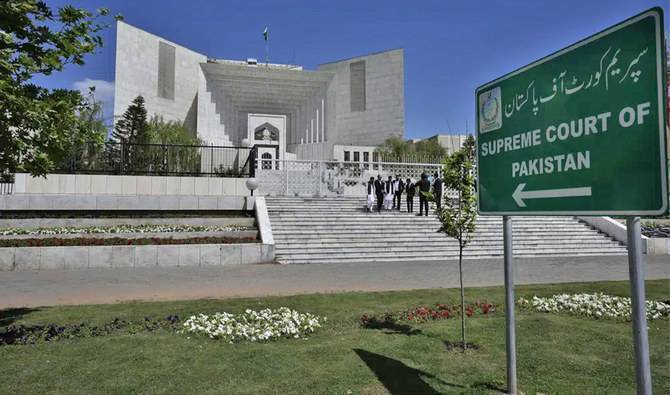Islamabad (Web Desk): The Supreme Court (SC) on Tuesday stopped accountability courts from issuing a final verdict in graft cases until the top court announces its ruling on appeals against in the National Accountability Bureau's (NAB) law amendments case.
The five-member bench headed by Chief Justice of Pakistan (CJP) Qazi Faez Isa and including Justice Aminuddin Khan, Justice Jamal Khan Mandokhail, Justice Athar Minallah and Justice Syed Hasan Azhar Rizvi began hearing the first-ever intra-court appeals (ICAs) against its judgment that declared amendments to the accountability laws as illegal.
The bench took up two ICAs, one filed by the federal government and the other by former Sui Southern Gas Company Limited managing director Zuhair Ahmed Siddiqui.
During the hearing, Attorney General for Pakistan (AGP) Mansoor Usman Awan represented the government.
He AGP informed the court that the federation had appointed Makhdoom Ali Khan as the counsel in this case but he was out of country and requested adjournment.
CJP Isa said that there were other petitioners in the case as well.
Pakistan People's Party (PPP) Senator Farooq H Naek also requested becoming a party in the case.
Farooq H Naik said that his was affected by the decision of NAB amendments.
"My client is NAB accused, this decision was given without making them a party," the lawyer said.
CJP Isa said that the minority decision of the NAB amendments case has also been issued.
Meanwhile, Makhdoom Ali Khan's assistant lawyer Saad Hashmi appeared in the apex court during the hearing. He said that Practice and Procedure Act (2023) was applicable to the NAB amendments case.
“In the NAB amendments case, the bench was not formed by the committee of judges,” he added.
The chief justice asked him if he wanted to pursue the point in the case.
The CJP said to the assistant counsel of Makhdoom Ali Khan that you wrote that under the NAB amendment case practice and procedure, a 5-member bench had to hear it.
"We will not go into the merits of the appeal. In that case we will either restore the petitions against the amendments and set up a fresh bench or withdraw the point," the CJP remarked.
You may then wait for the detailed decision of the Practice and Procedure Act (2023) before proceeding with the appeal.
At this, Naek said, “Please do not do this. Proceed with the current appeals. If this is done, then cases in the NAB courts would begin.” Justice Isa then noted, “See, Makhdoom Ali Khan has taken this ground in his application.” Here, Naek requested that he be made a respondent in the case as well.
The CJP said that apart from suspending the decision, the accountability courts can also be prevented from making the final decision.
"Six hearings were held after the third amendment came. In this situation, a judgment should have come on the third amendment as well," the CJP said.
Later, issuing the written decision of today's hearing the top court said that it was that under Clause 4 of the Practice and Procedure Act (2023), where there is a matter of constitutional interpretation, less than 5 judges cannot hear the case.
Makhdoom Ali Khan's assistant lawyer said the top court has declared Practice and Procedure Act (2023) as law correct, adding that in the pleas to suspend the decision.
The court issued notice to the PTI chief, NAB, AGP, all provincial advocate generals and advocate general for Islamabad in the case.
Subsequently, the SC adjourned the hearing till the detailed verdict on the law clipping the chief justice’s powers is released.
On September 15, a three-member larger bench of the top court, headed by then CJP Umer Ata Bandial and comprising Justice Ijaz Ul Ahsan and Justice Syed Mansoor Ali Shah the SC in a majority decision had allowed Pakistan Tehreek-e-Insaf (PTI) Chairman and former premier Imran Khan's petition challenging amendments made to the National Accountability Ordinance (NAO) 1999 by the Pakistan Democratic Movement's (PDM) coalition government, and ordered the restoration of corruption cases against public office holders.
The top court declared nine out of 10 amendments to the National Accountability Ordinance (NAO) 1999 null and void.
The SC directed the NAB to return all case records to the relevant courts within seven days.
The verdict also highlighted that the NAB amendments in question impacted the rights of the public as outlined in the Constitution.
Following the verdict, the anti-graft body reopened cases against political bigwigs including former prime ministers.
These include the Toshakhana reference against Pakistan Muslim League-Nawaz (PML-N) supremo Nawaz Sharif, Pakistan Peoples Party (PPP) Co-Chairman Asif Ali Zardari and former prime minister Yousuf Raza Gilani, along with the LNG reference against former prime minister Shahid Khaqan Abbasi and the rental power reference against former prime minister Raja Pervez Ashraf.
Later, the federal government filed an appeal under Section 5 of the Supreme Court (Practice and Procedure) Act 2023 against the top court's order.
The government in its appeal maintained the stance that by setting aside the law passed by parliament and making amendments to the NAB law, the top court had crossed its powers.
It was further contended that parliament was competent to legislate adding that it had enacted a law making amendments to the NAB law.
"If a legislation is repugnant to the fundamental rights of citizens, then the court can set it aside," the federal government contended but added that the amendments made to the NAB law did not affect the fundamental rights of citizens.


